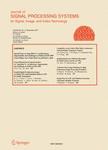版权所有:内蒙古大学图书馆 技术提供:维普资讯• 智图
内蒙古自治区呼和浩特市赛罕区大学西街235号 邮编: 010021

作者机构:Univ Jordan Amman Jordan
出 版 物:《JOURNAL OF SIGNAL PROCESSING SYSTEMS FOR SIGNAL IMAGE AND VIDEO TECHNOLOGY》 (超大规模集成电路信号处理系统杂志)
年 卷 期:2015年第78卷第2期
页 面:163-170页
核心收录:
学科分类:0808[工学-电气工程] 0809[工学-电子科学与技术(可授工学、理学学位)] 08[工学] 0812[工学-计算机科学与技术(可授工学、理学学位)]
主 题:Handwritten Arabic OCR FPGA Feature extraction Neural networks
摘 要:Arabic optical character recognition (OCR) has been an active field of research for decades. Yet, it has limited application domains constrained to printed text. This is partly due to high time complexity of Arabic OCR algorithms. Accelerating these algorithms allows for applications in real-time assistive technologies, office automation, and portable devices. Modern programmable hardware devices like FPGAs have numerous logic resources that allow parallel implementations of many algorithms. In this paper, we investigate implementing the feature extraction and classification stages of handwritten Arabic words on FPGAs. We study the performance and cost of four commonly-used feature extraction techniques and neural network classifiers on images from the IFN/ENIT database of handwritten Arabic words. The most efficient feature extraction technique and the best neural network found are implemented. Multiple FPGA implementations with varying cost and performance are evaluated. An implementation that only consumes about one quarter of the FPGA resources is 20 times faster than the software implementation and is less accurate by only 2.8 %.